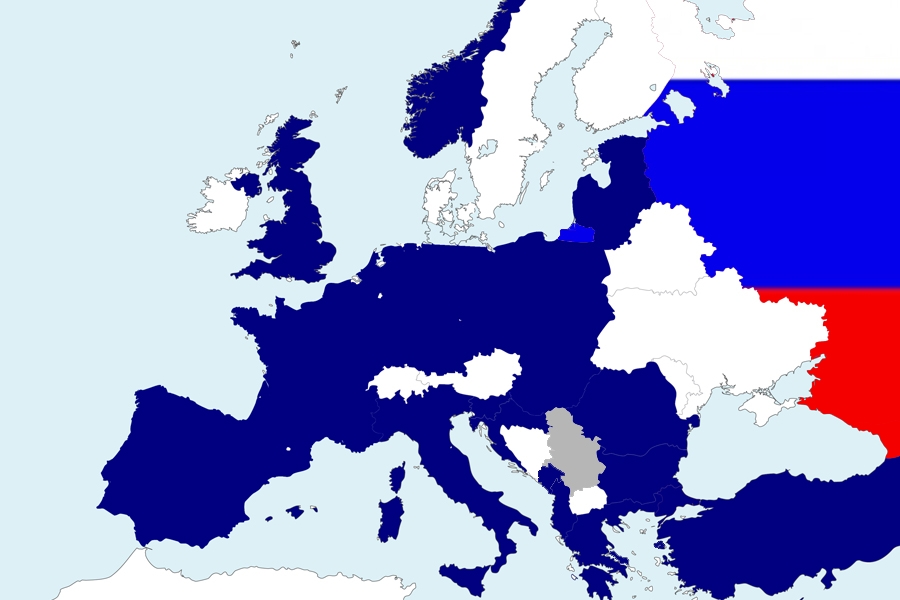We love Russia, but most of us would rather live in countries that already are members of the European Union (EU) and NATO, show the majority of surveys conducted in Serbia in recent years. Perhaps such an "arrangement" of feelings and desires seems somewhat confusing, but it is rather logical for a country in which there is a lack of public debate on issues related to its international position and in which decision-making is rather emotional.

We love Russia, but most of us would rather live in countries that already are members of the European Union (EU) and NATO, show the majority of surveys conducted in Serbia in recent years. Perhaps such an "arrangement" of feelings and desires seems somewhat confusing, but it is rather logical for a country in which there is a lack of public debate on issues related to its international position and in which decision-making is rather emotional.

In reality, Serbia is closer than ever to NATO. In the course of the last five years, it took part in as many as 44 joint military exercises with the US army, compared to only six with Russia. Within the Partnership for Peace framework Serbia participated in a total of 23 exercises. All of them took place in NATO member state territories, with the first joint military drill to be held in Serbias territory next year on agenda. Since 2014 Serbia has received a total of twelve million euros in help from NATO member states, and the last donation coming from Russia was received in 2014 amounting to 52,000 euros.
Over the past decade, the leadership has obviously avoided to speak of the actual level of relations with NATO on the one side, and Russia on the other, fearing that could badly impact their ratings among those from the electorate that have positive feelings towards Russia. Stuck between emotions and desire for the so called security, or military neutrality, Serbias public still has no clear answer to even the most basic questions such as, for example, whether NATO genuinely wants Serbia to become member of the alliance.
The aforementioned figures on donations and military exercises show, at the very least, that Serbia is more important to NATO than to Russia, which doesnt necessarily mean the alliance cant do without Serbia. The leading motive for NATO to allow Serbia access to its structures is not in Serbia itself, but outside it and is related to suppression of Russias influence in the region. In short, even if NATO doesnt care about Serbia as such, it certainly must be important for it to prevent further penetration of Russian interest, by bringing Serbia under its auspices.
Why would any military alliance leave to chance the possibility that a state, already largely or completely surrounded by its members, becomes an ally of a force that it sees as one of the most serious potential military opponents? Wouldnt it be more logical for such a country to be drawn into the alliance surrounding it, and thus create an important barrier to the influence of potentially hostile forces? Of course it would be so, and of course, anyone who seriously engages himself with international relations and security issues, takes this aspect into account.
In international relations, let me quote a rich real estate dealer, there are three things of utmost importance - the first is the interest, then comes the interest, and the third is the interest again (analog to location, location and location as the three most important things in the real estate realm). Serbia already owns the "location" for which it is of interest to all sides, but it is scarce in its capacity to discuss genuine interests in real terms, as well as the possible range of the strategy of military and political neutrality it opts for. The political elites have been holding on to a comfortable approach for years, saying that "the people didnt want that", which at the first glance, keeps them from being responsible.
In military terms, position of a country surrounded by members of a military alliance, that inclines directly to some other military block, is potentially very risky and difficult to sustain. For, in the event of a possible conflict between these two potential opponents, that country would become the initial target, and would have all the prospects of being destroyed. This could be avoided only in the event that, in the wake of the potential conflict, its allies rapidly overtake the NATO member territories in the region, and completely defeat their opponents, which is not much realistic to expect. At the same time, encirclement by NATO members and geographical distance make it almost impossible to have any genuine military alliance with Russia.
Serbia declared itself military neutral and expects to avoid being endangered in the event of a wider conflict. This stands in theory, but in practice, events often take unwanted course. Given the geographical location, the fact that it is poor and that it has nor the economical nor the political base (allies) to lean its military neutrality on, it should carefully and seriously take all potential options in consideration and assess whether and how long it can act on its own, not only in the military but also in the political sense.
Let me remind that, in recent past, Serbia already went through a tough experience that included conflicting interests of the biggest world powers. The bombing to which it was exposed in 1999 was carried out with loud protest from Russia and China, but it was eventually brought to an end as Belgrade accepted a set of conditions. Russian missiles and aviation existed only in media reports that raised the fighting spirit of the nation , but not in reality. The bombing is taken as pretext for the negative attitude towards NATO, but these are emotions too. There are only a few countries in Europe that avoided bombing one another, but their interests are now pointing towards each other.
In the modern world, military and political issues are formally not equivalent, while essentially they are the two sides of the same coin. So, once you have strategically decided to be a member of a major political alliance (the EU), whose members are already in the NATO, you can hardly avoid identifying yourself in military terms. Military neutrality should, in fact, include a powerful economic base, but Serbia doesnt have oil reserves like Norway or banks like Switzerland. But it still has allies, and they are in the EU.
The political elites have the assignment of taking care of the countrys international position, and all other potential threats it could be exposed to. In doing so, it is crucially important to create politics so that the country doesnt end up in a hopeless situation, with a lack of relevant allies, exposed to pressure and attacks that it simply cant pull through. In short, instead of ill will, emotions and luring of external and internal enemies, allies should be attracted. Instead of an argument -serious public debate on realities in the region, as well as setting of realistically achievable goals.
The populists will say that Serbia stood heroically in front of a far stronger opponent in two occasions - first time during the WWI and the second time in the course of the WWII. But back then Serbia and Yugoslavia were part of the victorious alliance, back then two opposite sides existed that one could choose from. In the modern times, things stand differently, and that was clearly seen during the bombing, i.e. the conflict with NATO. Simply, some new political and therefore potential military alliances have been built and fortified, while the power has been redistributed. Serbia is no longer the "backyard" between two potential global opponents. The "backyard" is now Ukraine, while Serbia is deep in the territory of one of the potential adversaries.
The essential question is, in fact, whether Serbia needs NATO, and not if NATO wants Serbia. Montenegro has, for example, just become a member of NATO, which enables it to negotiate open border issues with its neighbors (and there are such with Albania, Kosovo and Croatia) as a member of the largest military alliance in the world, and not alone and with no allies. It is certain that a significant percentage of the local population did not want to join NATO, but there was, and there still is the interest. In this respect, the conditions are quite comparable to those in Serbia, having in mind the open border issues, as well as other issues that demand powerful allies.
The people are the ones to ultimately choose and make decisions, but they also deserve to be offered clear and open arguments, as well as explanations about the possible consequences of this or that decision. People deserve respect and not manipulation of national emotions, personal tragedies many people endured during the bombing, as well as general sense of impotence to which the population was then exposed. People deserve to be part of the whole story, not an object of emotional manipulation accomplished in order to gain some votes.
In all societies there are issues that are rather being skipped. Certain...
The neoliberal path, started in 2001, has led to especially bad results in Serbi...
For centuries, the region was subsumed within the Ottoman and Hungarian Empires,...
"Serbia has returned to the systemic and anti-systemic position of the political...
In reality, Serbia is closer than ever to NATO. In the course of the last five y...